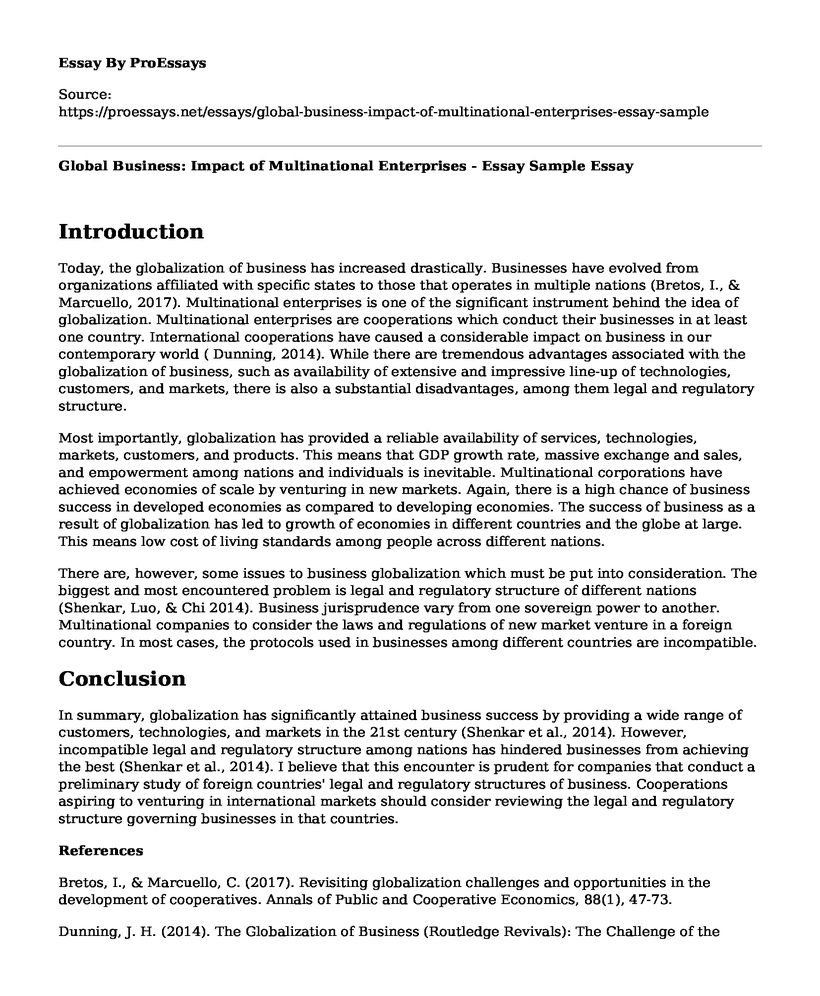Introduction
Today, the globalization of business has increased drastically. Businesses have evolved from organizations affiliated with specific states to those that operates in multiple nations (Bretos, I., & Marcuello, 2017). Multinational enterprises is one of the significant instrument behind the idea of globalization. Multinational enterprises are cooperations which conduct their businesses in at least one country. International cooperations have caused a considerable impact on business in our contemporary world ( Dunning, 2014). While there are tremendous advantages associated with the globalization of business, such as availability of extensive and impressive line-up of technologies, customers, and markets, there is also a substantial disadvantages, among them legal and regulatory structure.
Most importantly, globalization has provided a reliable availability of services, technologies, markets, customers, and products. This means that GDP growth rate, massive exchange and sales, and empowerment among nations and individuals is inevitable. Multinational corporations have achieved economies of scale by venturing in new markets. Again, there is a high chance of business success in developed economies as compared to developing economies. The success of business as a result of globalization has led to growth of economies in different countries and the globe at large. This means low cost of living standards among people across different nations.
There are, however, some issues to business globalization which must be put into consideration. The biggest and most encountered problem is legal and regulatory structure of different nations (Shenkar, Luo, & Chi 2014). Business jurisprudence vary from one sovereign power to another. Multinational companies to consider the laws and regulations of new market venture in a foreign country. In most cases, the protocols used in businesses among different countries are incompatible.
Conclusion
In summary, globalization has significantly attained business success by providing a wide range of customers, technologies, and markets in the 21st century (Shenkar et al., 2014). However, incompatible legal and regulatory structure among nations has hindered businesses from achieving the best (Shenkar et al., 2014). I believe that this encounter is prudent for companies that conduct a preliminary study of foreign countries' legal and regulatory structures of business. Cooperations aspiring to venturing in international markets should consider reviewing the legal and regulatory structure governing businesses in that countries.
References
Bretos, I., & Marcuello, C. (2017). Revisiting globalization challenges and opportunities in the development of cooperatives. Annals of Public and Cooperative Economics, 88(1), 47-73.
Dunning, J. H. (2014). The Globalization of Business (Routledge Revivals): The Challenge of the 1990s. Routledge.
Shenkar, O., Luo, Y., & Chi, T. (2014). International business. Routledge.
Cite this page
Global Business: Impact of Multinational Enterprises - Essay Sample. (2023, Mar 25). Retrieved from https://proessays.net/essays/global-business-impact-of-multinational-enterprises-essay-sample
If you are the original author of this essay and no longer wish to have it published on the ProEssays website, please click below to request its removal:
- New Marketing Strategies and Its Manifestation to PR Paper Example
- Defining Competitiveness, Designing Pay Levels, Mix, and Pay Structures Essay
- Essay on Product Push to Demand-Pull at Nike
- Securing a Skilled Workforce: Essential for Staying Relevant in a Competitive Market - Essay Sample
- Karl Marx: Capitalism, Labor & the Proletariat Revolution - Essay Sample
- Free Paper Sample: Equal Employment, Disparate Treatment and Equal Pay
- Research Proposal Sample on Nike Advert







